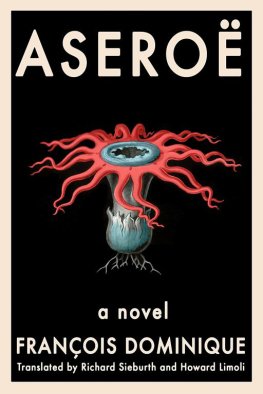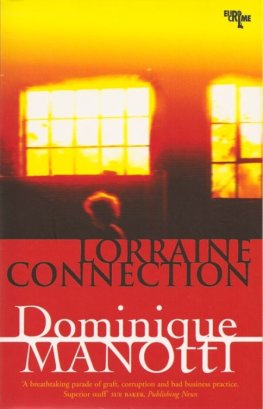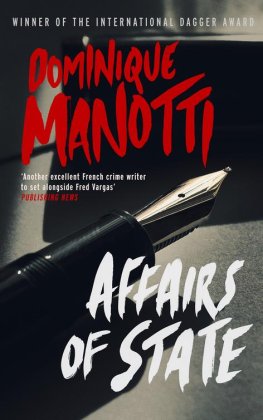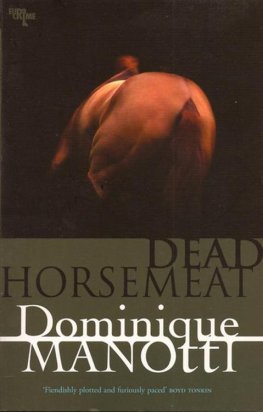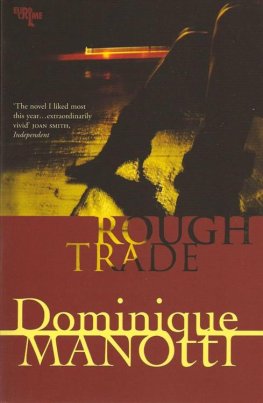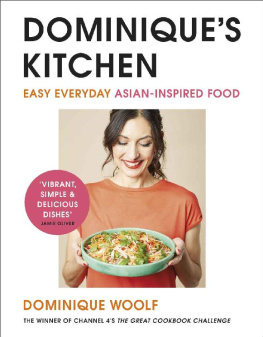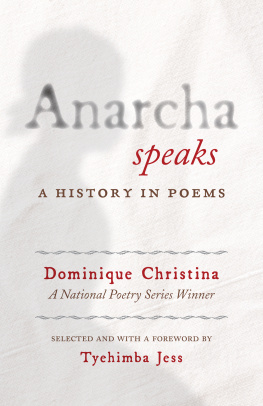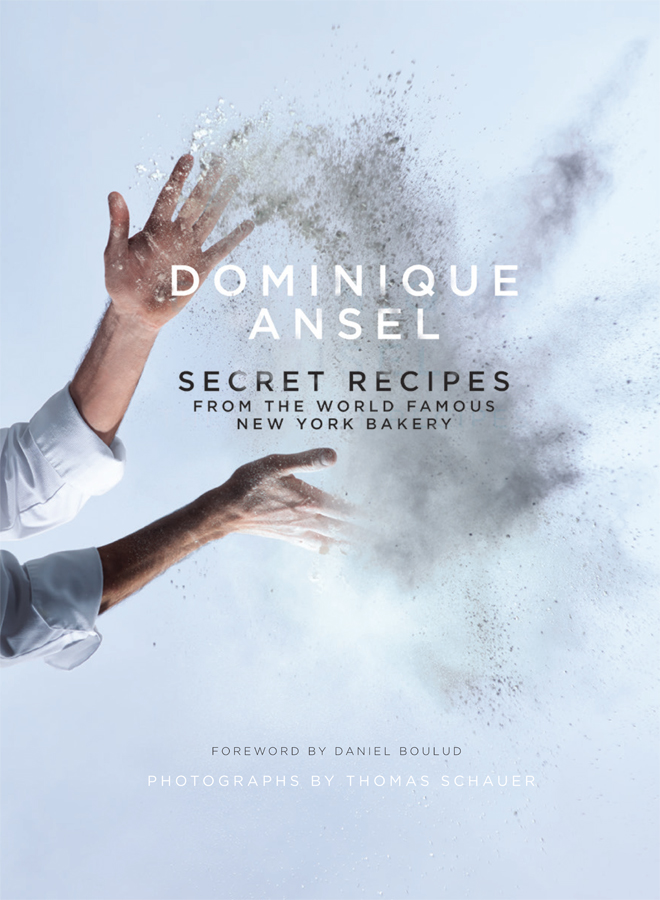A COOKBOOK
ABOUT ONE MAN,
ONE SMALL BAKERY
AND HOW A PASTRY
CAN INSPIRE THE WORLD
Everyone wants to know:
How does Dominique do it?
Dominique Ansel is the creator of the Cronut pastry, the croissant-doughnut hybrid that has taken the world by storm. But hes no one-hit wonder. Classically trained in Paris, leader of a three-Michelin-starred pastry kitchen in New York and now the proprietor of New Yorks highest-rated bakery, Dominique has become a modern-day Willy Wonka: the creator of wildly innovative, extraordinarily delicious and unbelievably popular desserts.
Presented here are some of Dominiques most coveted recipes, organised by skill level and catering to both amateur and professional bakers. Beginners can conquer the Chocolate Pecan Cookies with the molten chocolate centre; more experienced bakers will learn the secrets to the exquisite caramelised crust of this Cannel de Bordeaux; and the most adventurous will tackle the At-Home Cronut. In this, his first cookbook, Dominique reveals not only the secrets to his hit desserts but he describes the stories of inspiration behind each of them. The most important element in any dish is not a particular brand of chocolate or a type of salt but rather the spark of imagination.
At heart, Dominique Ansel is a book about innovation: how a cook can transform flour, sugar and butter into memories that last a lifetime; and how anyone, from any field, can try to add a little magic to their work.
Published in 2015 by Murdoch Books, an imprint of Allen Unwin
First published by Simon Schuster in 2014
Murdoch Books Australia
83 Alexander Street
Crows Nest NSW 2065
Phone: +61 (0) 2 8425 0100
Fax: +61 (0) 2 9906 2218
www.murdochbooks.com.au
| Murdoch Books UK
Erico House, 6th Floor
9399 Upper Richmond Road
Putney, London SW15 2TG
Phone: +44 (0) 20 8785 5995
www.murdochbooks.co.uk
|
For Corporate Orders Custom Publishing contact Noel Hammond,
National Business Development Manager, Murdoch Books Australia
Interior design by Suet Yee Chong
Jacket design by Marilyn Dantes
Photography by Thomas Schauer
Copyright 2014 by Dominique Ansel
The moral rights of the author have been asserted.
All rights reserved. No part of this publication may be reproduced, stored in a retrieval system or transmitted in any form or by any means, electronic, mechanical, photocopying, recording or otherwise, without the prior written permission of the publisher.
A cataloguing-in-publication entry is available from the catalogue of the National Library of Australia at www.nla.gov.au.
ISBN 9781743439791 (ebook).
A catalogue record for this book is available from the British Library.
IMPORTANT: Those who might be at risk from the effects of salmonella poisoning (the elderly, pregnant women, young children and those suffering from immune deficiency diseases) should consult their doctor with any concerns about eating raw eggs.
OVEN GUIDE: You may find cooking times vary depending on the oven you are using. For fan-forced ovens, as a general rule, set the oven temperature to 35F (20C) lower than indicated in the recipe.
MEASURES GUIDE: The recipes in this book use 15 ml (3 teaspoon) tablespoon measures.
NOTES ON INGREDIENTS:
Fleur de sel is a type of sea salt. Regular sea salt can be used in its place.
Kosher salt is preferred in these recipes for its flaky consistency. If Kosher salt is unavailable, use an equal amount of sea salt
or teaspoon of table salt for each 1 teaspoon of Kosher salt asked for.
Pearl sugar consists of extra large sugar crystals and is used for finishing and decoration.
Plain flour is also sometimes called all-purpose flour.
Pouring cream is also sometimes called thin or pure cream, among other names. The key to identifying the correct cream is its fat content look for a fat content around 35% for this kind of cream.
Unsweetened cocoa paste , also called cacao paste or mass, is pure bitter chocolate.
TO A.
FROM A CASE OF CHERRIES
TO A LIFE OF CHEERING,
YOU INSPIRE ME EVERY DAY.
D.
CONTENTS
FOREWORD
I am proud to contribute to Dominiques first book, not only as a former employer and longtime friend, but, more important, because I like to think we both share a special kinship as dreamers. Great chefs dont ask Why? They ask Why not? They arent afraid of a challenge and they arent afraid to break the rules. But they also have the technical training necessary to play with recipes while intuitively knowing which crucial steps should not be sacrificed. Dominique has demonstratedand will continue to demonstratethese exceptional qualities.
While he was the pastry chef at Daniel, Dominique challenged us to experiment more. He often tapped into our savoury pantry or looked to other cultures for inspiration. He was the first to introduce to the pastry menu elements like basil seeds, olive oil powder, horchata ice cream, and shiso sorbet. His talent was in reaching afar for something exciting and then working until it made sense within our determinedly French menu.
He approached classic American flavours with the naive curiosity of a student in his first cooking class. Why do the combinations of peanut butter and chocolateor Key lime and graham crackerget people so excited?
However, he also respected certain recipes and kept them as they were. Our magical madeleine, for example: that simply cannot change, because it has become so iconic to our customers, who have committed its taste and texture to memory.
I remember when Dominique was ready to branch out on his own. As a chef-owner, I always focus on our own program, but I strongly support the talent of my team members. I was happy to see that he could make his dreams come true on his own. Like all of our former pastry chefs, he has left an imprint that will be remembered.
When Dominique opened his pastry shop in SoHo, he jumped from managing a ten-item pastry menu with one service to an all-day menu consisting of viennoiseries , pastries, desserts, cookies, candies, sandwiches and more. His passion for constant improvement is palpable, whether its on the classics that he has practised since his very first job in Paris, or on the creations he discovered while on his global travels. I am pleased that Dominique has continued to represent the DNA of French patisserie while embracing a true New York je ne sais quoi . Items on his menu such as the ParisNew York, which has the texture of a Paris-Brest and the taste of a Snickers bar, is a great example of a hybrid from his imagination.
I had no doubt that he would excel and become the sensation that he is today, although perhaps not even I could have anticipated the media frenzy that ensued over the Cronut pastry! As long as I can have a seat on his cozy patio to enjoy his latest creation with an espresso, Ill be happy. I hope that as you read this book, you will be inspired to create not just the recipes within, but also to think creatively in your own day-to-day baking adventures, just as Dominique would have you do.


